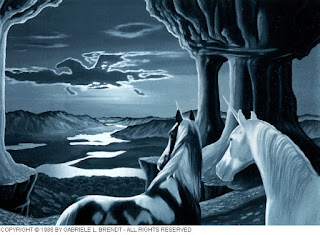 Fantasy literature transports you from the mundane world into the strange and the magical. How does it do this? By making that world believable, in its setting, its use of magic, and in its characters. To transport you, the fantasy world must be as complex and rich as reality. While I don’t like works that give long lectures on the history and geography, a sense of both must be present in the fantasy world—this sense preferably arising naturally from the needs of the plot and unfolding bit by bit. For example, in The Goddess’s Choice the way we learn about the longstanding animosity and history of warfare between Korth and Lundia is through the king’s pressure on the crown princess Samantha to marry. King Solar believes her marriage is necessary to maintain the fragile peace between the joined kingdoms. The history and culture of the joined kingdoms flow from and enhance the story’s central conflict.
Fantasy literature transports you from the mundane world into the strange and the magical. How does it do this? By making that world believable, in its setting, its use of magic, and in its characters. To transport you, the fantasy world must be as complex and rich as reality. While I don’t like works that give long lectures on the history and geography, a sense of both must be present in the fantasy world—this sense preferably arising naturally from the needs of the plot and unfolding bit by bit. For example, in The Goddess’s Choice the way we learn about the longstanding animosity and history of warfare between Korth and Lundia is through the king’s pressure on the crown princess Samantha to marry. King Solar believes her marriage is necessary to maintain the fragile peace between the joined kingdoms. The history and culture of the joined kingdoms flow from and enhance the story’s central conflict.
Magic is an essential element of fantasy; yet to be believable, any system of magic must be both consistent and limited in scope. When the limitations on the wizard or sorcerer are clearly established, tension builds as he or she must work within those limits. The existence of magic doesn’t allow the writer to cheat. My hero’s Robbie’s magic lies in the ability to connect to the mind and body of another. It only works on living things. He can’t suddenly have the ability to warp metal even though that would be convenient. The use of his magic also depletes him physically, so he must be wise in its use. His strength is also his vulnerability.
 For me, the most important element in creating a believable fantasy world lies in the characters. A believable world must be peopled with believable characters. In reality, few people are without flaws, but few are so bad that they have no redeeming qualities. Fantasy characters must be equally complex. Heroes must not be completely virtuous, and villains at least need sound motives for their villainy. Robbie is burdened with anger, and Samantha is headstrong and somewhat insensitive. On the other hand, Argblutal believes (with some justification) the throne is rightfully his and that he’d be a better king than a eighteen-year-old girl. When I read a novel, if I can believe a writer’s characters, I can forgive other inconsistencies with the work, but if I cannot believe the characters, nothing else the writer does can redeem the story. Depth of character is the key to believability in the make-believe world of fantasy.
For me, the most important element in creating a believable fantasy world lies in the characters. A believable world must be peopled with believable characters. In reality, few people are without flaws, but few are so bad that they have no redeeming qualities. Fantasy characters must be equally complex. Heroes must not be completely virtuous, and villains at least need sound motives for their villainy. Robbie is burdened with anger, and Samantha is headstrong and somewhat insensitive. On the other hand, Argblutal believes (with some justification) the throne is rightfully his and that he’d be a better king than a eighteen-year-old girl. When I read a novel, if I can believe a writer’s characters, I can forgive other inconsistencies with the work, but if I cannot believe the characters, nothing else the writer does can redeem the story. Depth of character is the key to believability in the make-believe world of fantasy.
I’d love to hear your comments on what makes a fantasy world work for you.
